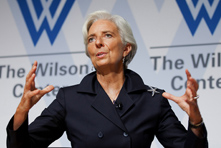
Typical street scene in Santa Ana, El Salvador. (Photo: iStock)
IMF Survey: Lagarde Urges Collective Action to Restore Confidence
September 15, 2011
- Global growth continuing but at a slower pace
- Debt problems in advanced countries have led to rise in financial stability risk
- Road to recovery needs repair, reform, rebalancing, and rebuilding
As uncertainty continues to roil the world’s financial markets, world leaders should act together to address the three main challenges facing the global economy: debt pressures sapping growth, risk of instability in the core of the global economic system, and social tension, the head of the IMF says.

Lagarde: one part of rebalancing to secure recovery is shifting back demand from public to private sector, when private sector can carry the load (IMF photo)
THE GLOBAL ECONOMY
“I believe there is a path to recovery, much narrower than before, and getting narrower. To navigate it, we need strong political will across the world―leadership over brinkmanship, cooperation over competition, action over reaction,” IMF Managing Director Christine Lagarde said September 15 at the Woodrow Wilson Center in Washington, D.C.
She made her remarks ahead of the Annual Meetings of the World Bank and IMF, where world economic leaders are expected to discuss the global economic outlook and look for ways to restore confidence.
The gathering will take place amid a worsening of the euro area debt crisis, rising financial strains in advanced countries, and disappointing data pointing to a softer global recovery, especially in the advanced countries. In emerging markets, the growth picture is brighter, but challenges include inflation pressures, managing strong credit growth, and rising current account deficits.
Several countries in the Middle East and North Africa face the task of transforming their economies in the wake of social upheaval, as discussed at the recent Group of Seven (G-7) Deauville Partnership meeting. And while low-income countries are doing reasonably well, they remain very vulnerable to economic dislocation from elsewhere in the world.
The IMF’s updated forecast for the world economy will be published September 20. About 13,000 policymakers, private sector and civil society representatives, journalists, and academics are expected to attend the Annual Meetings, which this year take place on September 23–24.
Overload of debt
In the short run, a key issue weighing on the recovery is the debt overhang in advanced countries. . In the United States, debt-laden households remain reluctant to spend and need some relief. In Europe, uncertainty about sovereign debt sustainability continues to undermine confidence, and European banks need sufficient capital buffers to support growth, Lagarde said.
“Weak growth and weak balance sheets—of governments, financial institutions, and households—are feeding negatively on each other, fueling a crisis of confidence and holding back demand, investment, and job creation.”
Rise in financial stability risks
A second, more long-term issue is the heightened risks to financial stability that stem from the interconnected nature of the world economy. Because of the lingering debt problems, such risks are on the rise.
“In our interconnected world, economic tremors in one country can reverberate swiftly and powerfully across the globe, especially if they originate in systemic economies,” Lagarde said.
Rising social tensions
Social strains are evident in many parts of the world, not just in the countries undergoing severe adjustment. Global unemployment is at an all-time high, and at risk of becoming entrenched, especially among young people.
“I see a number of interweaving strands here—entrenched high unemployment, especially among the younger generation; fiscal austerity that chips away at social protections; perceptions of unfairness in ‘Wall Street’ being given priority over ‘Main Street’; and legacies of growth in many countries that predominantly benefited the top echelons of society,” Lagarde said.
Repair, reform, rebalance, rebuild
To address the rising risks that major economies may slip back instead of moving forward, four key policy dimensions need to be addressed by policymakers, Lagarde said.
• Repair. Advanced countries need credible medium-term plans to stabilize and lower public debt ratios. But consolidating too quickly can hurt the recovery and worsen job prospects. So the challenge is to navigate between the twin perils of losing credibility and undermining growth.
• Reform. The financial sector in particular needs further reform. Substantial gaps remain in areas like supervision, cross-border resolution, too-important-to-fail, and shadow banking systems. International cooperation is needed across all dimensions to avoid regulatory arbitrage. Reforms are needed in other areas as well, including job-creating measures.
• Rebalance. First, demand needs to shift back from the public to the private sector, when the private sector is strong enough to carry the load. This has not happened yet. Second, we also need a global demand switch from external deficit to external surplus countries―with lower spending and higher savings in the advanced economies, key emerging markets must take up the slack and start providing the demand needed to power the global recovery.
• Rebuild. Low-income countries in particular need to rebuild their economic policy buffers—including fiscal positions—that served them well during the crisis, to protect themselves against future storms. This will also help provide the space for growth-enhancing public investment and social safety nets.
Role of the IMF
Lagarde noted that the IMF—with its 187 member countries—is uniquely positioned to foster collective action among its global membership.
• The IMF can help identify risks and opportunities arising from the interconnectedness between economies.
• Through its policy advice, the IMF can shine a light on the key issues—growth, vulnerabilities, and spillover effects—and help guide international cooperation.
• IMF financing can provide breathing space for countries to overcome immediate economic challenges.
• In the longer term, the IMF can also help construct a safer and more stable international financial system.
The IMF’s policy steering committee, the International Monetary and Financial Committee, will meet on September 24. Looking further ahead, the Group of Twenty (G-20) industrialized and emerging market economies will meet in Cannes on November 3–4 to discuss ways to strengthen global economic cooperation.


